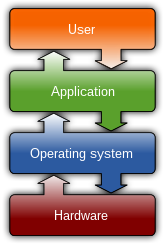
Back Rekenaarsekuriteit Afrikaans أمن الحاسوب Arabic Seguridá informática AST Kibertəhlükəsizlik Azerbaijani Компютърна сигурност Bulgarian কম্পিউটার নিরাপত্তা Bengali/Bangla Sigurnost računara BS Seguretat informàtica Catalan Seguridad sa kompyuter CEB ئاسایشی کۆمپیوتەر CKB
| Part of a series on |
| Computer hacking |
|---|
| Operating systems |
|---|
 |
| Common features |

Computer security (also cybersecurity, digital security, or information technology (IT) security) is the protection of computer software, systems and networks from threats that can lead to unauthorized information disclosure, theft or damage to hardware, software, or data, as well as from the disruption or misdirection of the services they provide.[1][2]
The significance of the field stems from the expanded reliance on computer systems, the Internet,[3] and wireless network standards. Its importance is further amplified by the growth of smart devices, including smartphones, televisions, and the various devices that constitute the Internet of things (IoT). Cybersecurity has emerged as one of the most significant new challenges facing the contemporary world, due to both the complexity of information systems and the societies they support. Security is particularly crucial for systems that govern large-scale systems with far-reaching physical effects, such as power distribution, elections, and finance.[4][5]
Although many aspects of computer security involve digital security, such as electronic passwords and encryption, physical security measures such as metal locks are still used to prevent unauthorized tampering. IT security is not a perfect subset of information security, therefore does not completely align into the security convergence schema.
- ^ Schatz, Daniel; Bashroush, Rabih; Wall, Julie (2017). "Towards a More Representative Definition of Cyber Security". Journal of Digital Forensics, Security and Law. 12 (2). ISSN 1558-7215.
- ^ Computer security at the Encyclopædia Britannica
- ^ Tate, Nick (7 May 2013). "Reliance spells end of road for ICT amateurs". The Australian.
- ^ Kianpour, Mazaher; Kowalski, Stewart; Øverby, Harald (2021). "Systematically Understanding Cybersecurity Economics: A Survey". Sustainability. 13 (24): 13677. doi:10.3390/su132413677. hdl:11250/2978306. ISSN 2071-1050.
- ^ Stevens, Tim (11 June 2018). "Global Cybersecurity: New Directions in Theory and Methods" (PDF). Politics and Governance. 6 (2): 1–4. doi:10.17645/pag.v6i2.1569. Archived (PDF) from the original on 4 September 2019.